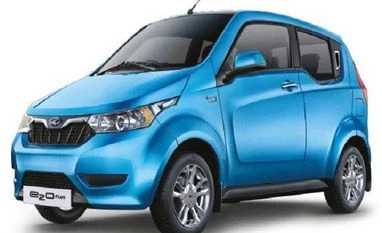Mahesh Babu, chief executive at Mahindra Electric, confirmed that the company had stopped the production of the model for the domestic market. The move, he said, was in line with the company’s plan to “reorient the electric hatchback” segment.
“Since there are some regulations on airbags and ABS (anti-lock braking system), we are reorienting our hatch segment,” said Babu. The phase-out, he added, was part of the model changeover plan. The e2oPlus will continue to sell in neighbouring markets such as Nepal. In India, it will be replaced by the electric version of the KUV100 later this year.
“We want a good hatch and believe the eKUV will be a perfect fit for the segment,” said Babu. Mahindra first showcased the model at the 2018 Auto Expo. Mahindra is currently the only carmaker in India that sells electric cars (the e2oPlus and eVerito). The carmaker might launch the eKUV under the e2o brand, said a person familiar with the company’s plans. Another reason for discontinuing the e2o model was poor sales, said Babu, adding that on average the company was selling around 50 units in the personal segment.
Mahindra acquired a controlling stake in Bengaluru-based Reva Electric Car Co (RECC) in 2010, hoping to take advantage of the rapid pace at which the electric vehicle market was expected to grow over the next decade amid the push for stricter emission norms globally.
The Reva had had its share of woes and it never took off in the Indian market, with reasons ranging from high acquisition cost to uncertainty over the government’s EV policy, among others. Between 2001, the year the company was founded, and 2010, RECC had sold only 3,500 units of the model. With the acquisition, Mahindra had expected a head start of three to four years over potential rivals. Subsequently, in 2013, Mahindra bought the remaining stake of the Maini family in RECC, merged the company with the parent firm, and renamed it as Mahindra Electric Mobility.
Despite fresh investment and regular interventions, the model’s sales remained low, amid policy flip-flops on electric vehicles and non-acceptance of electric vehicles for personal use by car buyers. In the year ended on March 31, Mahindra Electric sold 350 units, including the E2O, eVerito, e-three-wheelers and e-vans, in the domestic market, down 45.82 per cent over the same period a year ago.
To read the full story, Subscribe Now at just Rs 249 a month
Already a subscriber? Log in
Subscribe To BS Premium
₹249
Renews automatically
₹1699₹1999
Opt for auto renewal and save Rs. 300 Renews automatically
₹1999
What you get on BS Premium?
-
Unlock 30+ premium stories daily hand-picked by our editors, across devices on browser and app.
-
Pick your 5 favourite companies, get a daily email with all news updates on them.
Full access to our intuitive epaper - clip, save, share articles from any device; newspaper archives from 2006.
Preferential invites to Business Standard events.
Curated newsletters on markets, personal finance, policy & politics, start-ups, technology, and more.
Need More Information - write to us at assist@bsmail.in
)